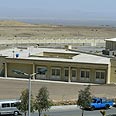
Natanz nuclear facility
Photo: AFP
Seven international envoys got a look inside an Iranian nuclear site Saturday for a tour that Tehran hopes will build support before a new round of crucial talks with world powers on its disputed atomic activities.
Iran is trying to sell the tour as a gesture of transparency ahead of the Jan. 20-22 talks in Istanbul, Turkey. In a blow to the effort, however, key powers Russia, China and the European Union refused the Iranian invitation. The EU said it should be up to inspectors from the UN's International Atomic Energy Agency to verify whether Iran's program is entirely peaceful.
Nuclear Scientist's Murder
In video interview Majid Jamal Fash admits to murder of nuclear scientist last year, describes training at Israeli hands. He also uses opportunity to issue a complaint: Israel still owes me $25,000
Iran's offer pointedly did not include the United States, one of its biggest critics internationally, and many saw the tour as an attempt to divide the nations conducting the nuclear talks.
Ambassadors to the UN atomic agency from Egypt, Cuba, Syria, Algeria, Venezuela, Oman and the Arab League arrived in Tehran early Saturday and visited the unfinished heavy water reactor near Arak in central Iran, state TV reported.
The group is expected later to tour the uranium enrichment facility near Natanz.
The US and some of its allies accuse Iran of using its civil nuclear program as a cover to develop a nuclear weapons capability. Iran has denied the accusation, saying its nuclear work is merely geared towards producing nuclear energy and isotopes to treat medical patients.
To support that assertion, Iran planned to announce two nuclear-related medical achievements during the visit, said Ali Akbar Salehi, Iran's nuclear chief and the country's acting foreign minister. He did not elaborate.
'Sign of transparency'
With crucial talks between Iran and six world powers in Istanbul just days away, the timing of the nuclear tour and the choice of nations invited appeared to be an attempt to weaken unity among Iran's interlocutors.
In particular, there have been differences among them on the issue of imposing economic and other penalties on Iran as a way to pressure it to make concessions.
Moscow and Beijing, for example, have generally opposed attempts by the other four - the United States, Britain, France and Germany - to sharpen UN sanctions on Iran over its refusal to stop activities that could be potentially used to make nuclear weapons.
Iran's envoy to the Vienna-based UN agency, Ali Asghar Soltanieh, said on state TV that while Russia and China "welcomed warmly this positive initiative" the two nations could not attend because of time conflicts.
Soltanieh said the EU was wrong to connect the tour with the UN agency's inspections.
"This is the visit of IAEA ambassadors. It has nothing to do with IAEA inspections," Soltanieh said.
Acting Foreign Minister Ali Akbar Salehi, who is also Iran's nuclear chief, said the invitations were intended as a trust-building measure, contending that - outside of his nation - no other country has put its nuclear facilities on display for others.
While Iranian officials deny that sanctions have hurt their nation's economy, the invitation may be a sign that Tehran is looking to ease the burden of the UN penalties.
Tehran's decision to return to talks could reflect some readiness to compromise on Security Council demands. Still, hopes are modest. The Istanbul meeting follows on a first round last month in Geneva that ended with little progress other than a decision to meet again.
Soltanieh sought to play up the weekend visit, saying the seven ambassadors taking part represented 120 countries from the Non-Aligned Movement and the Group of 77 developing nations.
"These ambassadors and envoys ... have welcomed the Iranian initiative and see it as a sign of transparency in Iran's nuclear activities," the official IRNA news agency quoted Soltanieh as saying Saturday.
He said it was a replay of a 2007 visit to Iran's uranium conversion facility in Isfahan, central Iran, when several ambassadors visited the facility.
Soltanieh said the EU has "missed a historic opportunity" for cooperation.
"Out of its goodwill, the Islamic Republic of Iran invited several other countries, including the EU, to join the representatives of a majority of the world countries but they didn't use this historic opportunity for solidarity and cooperation and observe Iran's peaceful nuclear activities," IRNA quoted him as saying.
- Follow Ynetnews on Facebook















